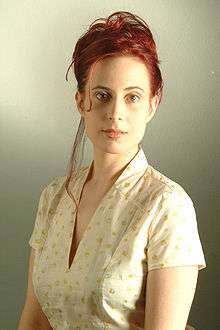Hagar Yanai
| Hagar Yanai הגר ינאי | |
|---|---|
 Hagar Yanai | |
| Born |
1972 Kibbutz, Barkai |
| Nationality | Israeli |
| Occupation | Novelist |
| Known for | Prime Minister's Award Winner, Geffen Award |
Hagar Yanai (Hebrew: הגר ינאי; born 1972) is an Israeli author and recipient of the 2008 Prime Minister's Award for Israeli Authors.[1] She is also a two-time recipient of the Geffen Award for Best Original Hebrew Fantasy.[2]
Life and Works
Hagar Yanai was born in Kibbutz, Barkai in 1972. Following her army service she studied Anthroposophy for two years at Kibbutz Harduf. After deciding not to adopt the spiritual anthroposophist way of life she traveled to Japan. There she studied for a year with a Zen master in Tokyo, and also worked as a hostess in night clubs. She spent some time in a Zen monastery in Kyosho, and had an affair with the head of the monastery, which she wrote about in her first book, A Woman in Light.[3]
Yanai received her Bachelor's degree in creative writing and screenwriting from Camera Obscura School of Art, and her Master's degree in literature from Ben-Gurion University of the Negev. She worked as a journalist for Hayim Aherim (A Different Life) magazine, and for the weekend supplement of Hebrew daily Ha'aretz. She was also a book critic for the Hebrew daily Globes, and the literary and film critic for Israeli Television Channel Two. Today she works as a literary editor, teaches creative writing, and is a book critic for the IDF radio station and Israel Television Channel One.[4]
Her second book, Alex's Eternity Machine, describes the journey of a rebellious female soldier in the Golan Heights. The soldier, Duba, runs away from a young and aggressive officer who wants to rehabilitate her, and looks for Alex, a young physics genius, with whom she fell in love in her youth, and who is trying to invent the Perpetuum Mobile. The book was nominated for the 2006 Sapir Prize for Literature.[5][6]
Yanai's third book, The Leviathan of Babylon, is the first of a fantasy trilogy. She wrote the book in a groundbreaking effort to create a widespread audience in the Israeli literary scene for the fantasy genre - her favorite. The book follows the adventures of Jonathan Margolis and his sister Ella, who enter a parallel world, the Empire of Babylon, ruled by the Guild of Hashdarpans – brutal physician-priests who fear the rise of the Leviathan, son of the Abyss. The book draws inspiration from Jewish, Babylonian and Middle-Eastern mythology. The Leviathan of Babylon was awarded the 2007 Geffen Award for Best Original Hebrew Fantasy.[7]
Yanai's fourth book and the second in The Leviathan of Babylon trilogy, The Water Between the Worlds, was published in February 2008. It describes the beginning of the great battle for the Empire of Babylon. The four protagonists from the first book, Jonathan and Ella Margolis, Hillel Ben-Shahar, and Princess Nin-Urmuz, are faced with even more difficult challenges and ordeals. The Water Betwixt the Worlds was awarded the 2008 Geffen Award for Best Original Hebrew Fantasy. Yanai was also awarded the 2008 Prime Minister's Award for Israeli Authors.[8]
Books Written by Hagar Yanai
- A Woman in Light, Jerusalem, Keter, 2001
- Alex's Eternity Machine, Jerusalem, Keter, 2004
- The Leviathan of Babylon, Jerusalem, Keter, 2006
- The Water Betwixt the Worlds, Jerusalem, Keter, 2008
Books Edited by Hagar Yanai
- Roses Over There: Erotic Fiction by Israeli Writers, Tel Aviv, Alfa, 2003
- Signed By / Orit Shahar-Guber, Jerusalem, Keter, 2005
References
- ↑ הוכרזו הזוכים בפרסי היצירה לתשס"ט [The winners of the 2008 Prime Minister Award have been announced] (in Hebrew). Ynet. 21 December 2008. Retrieved 21 August 2014.
- ↑ Avner Shapira (22 October 2008). הגר ינאי זכתה בפרס גפן לספרי פנטסיה [Hagar Yanai won the Geffen Award for Fantasy books] (in Hebrew). Akbar Hahyir. Retrieved 21 August 2014.
- ↑ Gon Ben Ari (16 March 2008). "Hocus Pocus" (in Hebrew). Ynet,. Retrieved 21 August 2014.
- ↑ Hagar Yanai – From the New Hebrew Literature Lexicon (Hebrew)
- ↑ Eli Eshed (18 February 2005). התיאוריה הסופית של הגר ינאי [Hagar Yanai's Final Theory] (in Hebrew). Eli Eshed's blog in "Reshimot" site. Retrieved 21 August 2014.}
- ↑ Yoram Kaniuk (30 January 2005). "Yielding is Power" (in Hebrew). Ynet. Retrieved 21 August 2014.
- ↑ Gili Bar-Hillel (26 June 2006). נפתולי בבל [Babylon Meandering] (in Hebrew). Ynet. Retrieved 21 August 2014.
- ↑ Shahar Ilan (August 2008). "A leviathan at Azrieli". Haaretz Books Supplement. Retrieved 21 August 2014.
External links
- The Leviathan of Babylon Website (Hebrew)
- Excerpt from The Leviathan of Babylon (Hebrew)
- Eli Eshed (13 February 2005). "Anti-Aging" (in Hebrew). NRG.
- Lilach Wallach (31 May 2006). "הלוויתן מבבל" נושא את אג'נדת אהבת המלנכוליה בעולם פנטסטי מענג [The Leviathan of Babylon conveys the agenda of the love of melancholy in a pleasurable world of fantasy] (in Hebrew). Nana 10.
- Shahar Ilan (7 July 2008). לווייתן ברכבת השלום [Leviathan in a Peace Train]. Haaretz (in Hebrew). On the book The Water Betwixt the Worlds.
- Hagar Yanai (6 November 2007). מי אמר שאין פה פנטזיה? [Who says there is no fantasy mouth?] (in Hebrew). Ynet. Hagar Yanai recommends five fantasy books that are Israeli in essence.
- Amichai Shalev (7 November 2008). "החדר שבין העולמות" [The Room Between the Worlds]. Ynet.